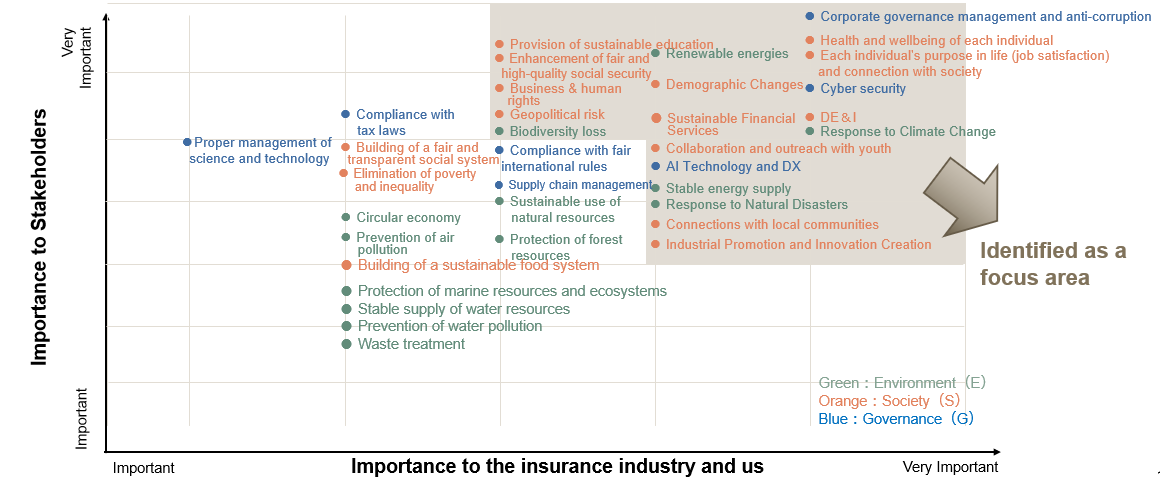The Dai-ichi Life Group formulated its medium-term management plan for fiscal years 2024 to 2026, and based on the Group Purpose, the Group has newly formulated “Core Materiality,” a set of key issues that our group will prioritize in order to realize its vision for 2030.
In formulating the Core Materiality, we took the following steps based on advice from external experts and discussions at the Group Sustainability Promotion Committee, the Executive Management Board, and the Board of Directors.
The Core Materiality is determined by resolution at the Board of Directors as part of the Medium-Term Management Plan. Going forward, we will continue to put Core Materiality at least once a year on the agenda of the Group Sustainability Promotion Committee to appropriately identify social changes and conduct flexible reviews.
Selection of Core Materiality
Step1
Identifying and organizing social issues
|
- Based on the 17 targets and 169 targets of the SDGs, we selected 35 social issues were selected based on reports from international organizations and advice from outside experts in order to consider the priority and importance of social issues that should be addressed with greater specificity. (Reference (1))
|
Reference (1)
35 Social Issue Themes
Environment
(13 topics) |
- Renewable energies
- Response to Climate Change
- Biodiversity loss
- Stable energy supply
- Sustainable use of natural resources
- Response to Natural Disasters
- Circular economy
- Prevention of air pollution
- Protection of forest resources
- Protection of marine resources and ecosystems
- Stable supply of water resources
- Prevention of water pollution
- Waste treatment
|
Social
(15 topics) |
- Health and wellbeing of each individual
- Provision of sustainable education
- Each individual's purpose in life (job satisfaction) and connection with society
- Enhancement of fair and high-quality social security
- Demographic changes
- Business & human rights
- Geopolitical risk
- DE&I
- Sustainable Financial services
- Building of a fair and transparent social system
- Collabolation and outreach with youth
- Elimination of poverty and inequality
- Connections with local communities
- Industrial Promotion and Innovation Creation
- Building of a sustainable food system
|
Governance
(7 topics) |
- Corporate governance management and anti-corruption
- Cyber security
- Compliance with tax laws
- Proper management of science and technology
- Compliance with fair international rules
- AI Technology and DX
- Supply chain management
|
Step2
Evaluating Priority and Importance |
- We plotted the 35 key issues into the Materiality Map (Vertical axis: level of interest from stakeholders including international organizations, NGOs, long-term investors, and ESG rating agencies; horizontal axis: level of importance in the insurance industry) to evaluate priorities and importance based on double materiality.
- In addition, based on discussions at the Group Sustainability Committee, the Executive Management Board, and the Board of Directors, some important items in the Group business were revised.
|
Step3
Identify focus areas |
- Based on the prioritization in Step 2, 20 items in the focus area with high interest and importance were identified as important issues (Reference (2))
|
Reference (2)
Identify focus areas
Step4
Formulating Core Materiality |
- With regard to the 20 items identified in Step 3, the Core Materiality is formulated after considering the common denominator for each item (Reference (3)).
|
Reference (3)
Formulating Core Materiality
Business
Ⅰ.Financial Well-being for All
People/Society
Ⅱ.Healthy People and Society
Environment
Ⅲ.Environmental Leadership
Foundation
Ⅳ.Proactive Governance and Engagement
